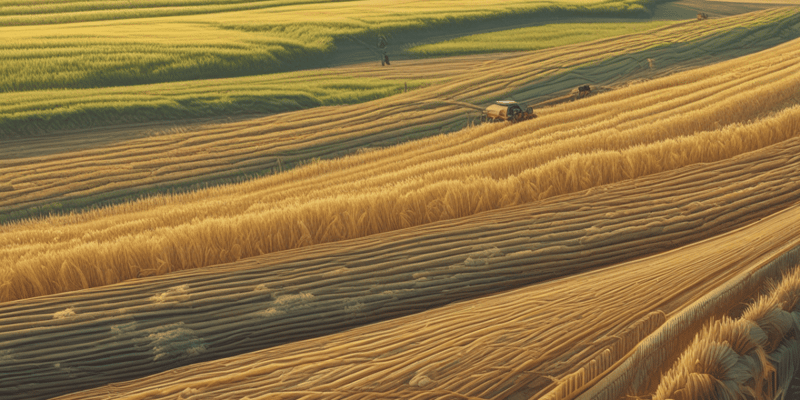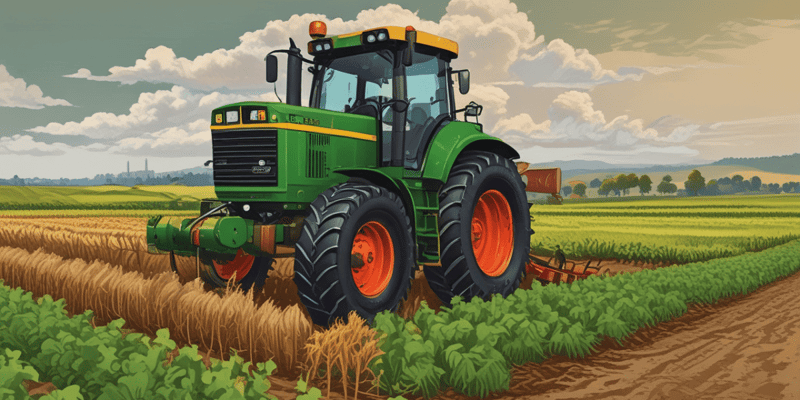Podcast
Questions and Answers
What is one significant benefit of modern irrigation methods in agriculture?
What is one significant benefit of modern irrigation methods in agriculture?
Which of the following best describes the role of organic farming in crop production?
Which of the following best describes the role of organic farming in crop production?
How do fertilizers differ from manure in agricultural practices?
How do fertilizers differ from manure in agricultural practices?
What role does Rhizobium bacteria play in agriculture?
What role does Rhizobium bacteria play in agriculture?
Signup and view all the answers
Which statement accurately reflects the advantages of crop rotation?
Which statement accurately reflects the advantages of crop rotation?
Signup and view all the answers
What is a primary disadvantage of relying solely on traditional agricultural practices?
What is a primary disadvantage of relying solely on traditional agricultural practices?
Signup and view all the answers
Which benefit is associated with the use of modern agricultural tools?
Which benefit is associated with the use of modern agricultural tools?
Signup and view all the answers
How do legumes contribute to sustainable agriculture?
How do legumes contribute to sustainable agriculture?
Signup and view all the answers
Which of the following is a primary benefit of implementing crop rotation in farming?
Which of the following is a primary benefit of implementing crop rotation in farming?
Signup and view all the answers
What distinguishes organic farming from conventional farming?
What distinguishes organic farming from conventional farming?
Signup and view all the answers
What is the primary role of Rhizobium bacteria in agriculture?
What is the primary role of Rhizobium bacteria in agriculture?
Signup and view all the answers
Which statement accurately reflects the difference between fertilizers and manure?
Which statement accurately reflects the difference between fertilizers and manure?
Signup and view all the answers
Why is irrigation considered crucial in agriculture?
Why is irrigation considered crucial in agriculture?
Signup and view all the answers
What is one major advantage of planting legumes in crop rotation?
What is one major advantage of planting legumes in crop rotation?
Signup and view all the answers
Which technique primarily reduces soil erosion and improves nutrient availability?
Which technique primarily reduces soil erosion and improves nutrient availability?
Signup and view all the answers
What is a significant consequence of over-relying on chemical fertilizers?
What is a significant consequence of over-relying on chemical fertilizers?
Signup and view all the answers
What is the primary purpose of irrigation in agriculture?
What is the primary purpose of irrigation in agriculture?
Signup and view all the answers
Which of the following is NOT an advantage of organic farming?
Which of the following is NOT an advantage of organic farming?
Signup and view all the answers
How do fertilizers differ from manure in agricultural practices?
How do fertilizers differ from manure in agricultural practices?
Signup and view all the answers
What role does Rhizobium bacteria play in agriculture?
What role does Rhizobium bacteria play in agriculture?
Signup and view all the answers
What is the primary benefit of incorporating legumes in crop rotation?
What is the primary benefit of incorporating legumes in crop rotation?
Signup and view all the answers
Which practice is vital for the preparation of soil in agriculture?
Which practice is vital for the preparation of soil in agriculture?
Signup and view all the answers
In the context of crop production, what is a disadvantage of relying solely on chemical fertilizers?
In the context of crop production, what is a disadvantage of relying solely on chemical fertilizers?
Signup and view all the answers
Which seasonal pattern do Kharif crops follow in India?
Which seasonal pattern do Kharif crops follow in India?
Signup and view all the answers
Study Notes
Crop Production and Management
- Importance of food production: Necessary to fulfill the needs of a large population through regular production, management, and distribution.
- Agricultural practices have evolved significantly from traditional to modern techniques over the years.
- Traditional agriculture relied on manual tools like sickles and bullock ploughs, with natural rainfall for irrigation.
- Modern agriculture utilizes advanced technology like tractors, seed drills, and harvesters, alongside soil testing and the use of quality seeds.
- Awareness of new agricultural technologies is crucial for improved crop yields.
Crop Types and Seasons
- Crops can be classified based on the seasons in which they are grown, primarily as Kharif and Rabi crops.
- Kharif crops: Grown during the rainy season (June to September). Examples include paddy, maize, soyabean, groundnut, and cotton.
- Rabi crops: Grown during the winter season (October to March). Examples include wheat, gram, pea, mustard, and linseed.
Agricultural Practices
- Preparation of soil: The first critical step in crop production. It involves turning and loosening the soil for better growth conditions.
- Sowing: The process of planting seeds in the prepared soil.
- Fertilization: Adding manure and fertilizers to enhance soil nutrients.
- Irrigation: Providing water to crops to support growth, especially in periods without rain.
- Protecting from weeds: Essential for ensuring that crops do not compete for nutrients and resources.
- Harvesting: The process of gathering the mature crops from the fields.
- Storage: Properly storing the harvested crops to prevent spoilage and loss.
Effects of Weather on Agriculture
- Extreme cold and heat can adversely affect plant growth and yield.
- Continuous rain may lead to waterlogging and negatively impact plant health and productivity.
Historical Context
- Agriculture began around 10,000 B.C.E. as humans transitioned from nomadic lifestyles to cultivating land for food.
- The emergence of agriculture was foundational for civilization, leading to the development of stable food sources such as rice and wheat.
Studying That Suits You
Use AI to generate personalized quizzes and flashcards to suit your learning preferences.
Related Documents
Description
This quiz covers essential topics in crop production and management, focusing on the effects of weather extremes and sustainable practices. Explore how different environmental factors, such as extreme temperatures and rain, influence plant growth and the importance of fertilizers and manure. It's an engaging opportunity to test your knowledge in agricultural science.




